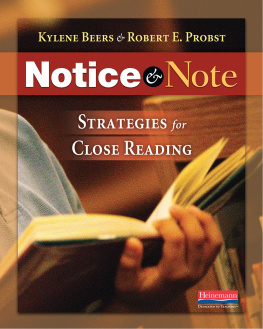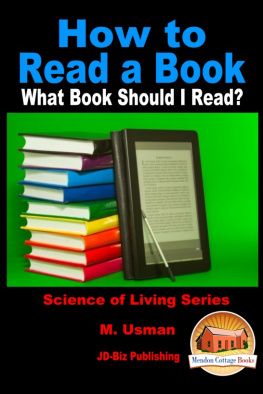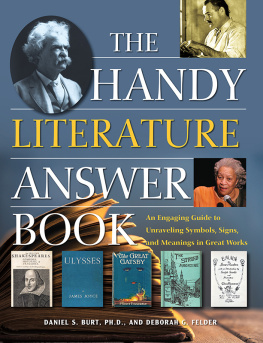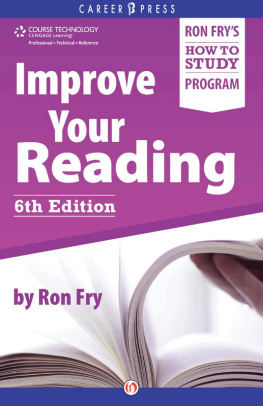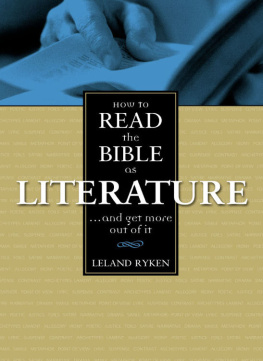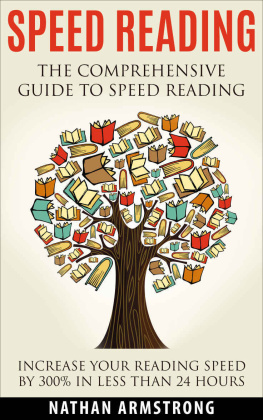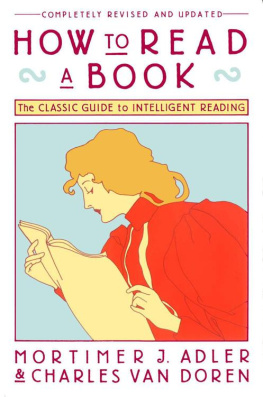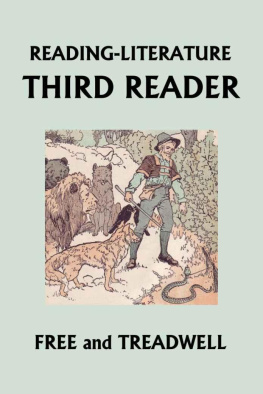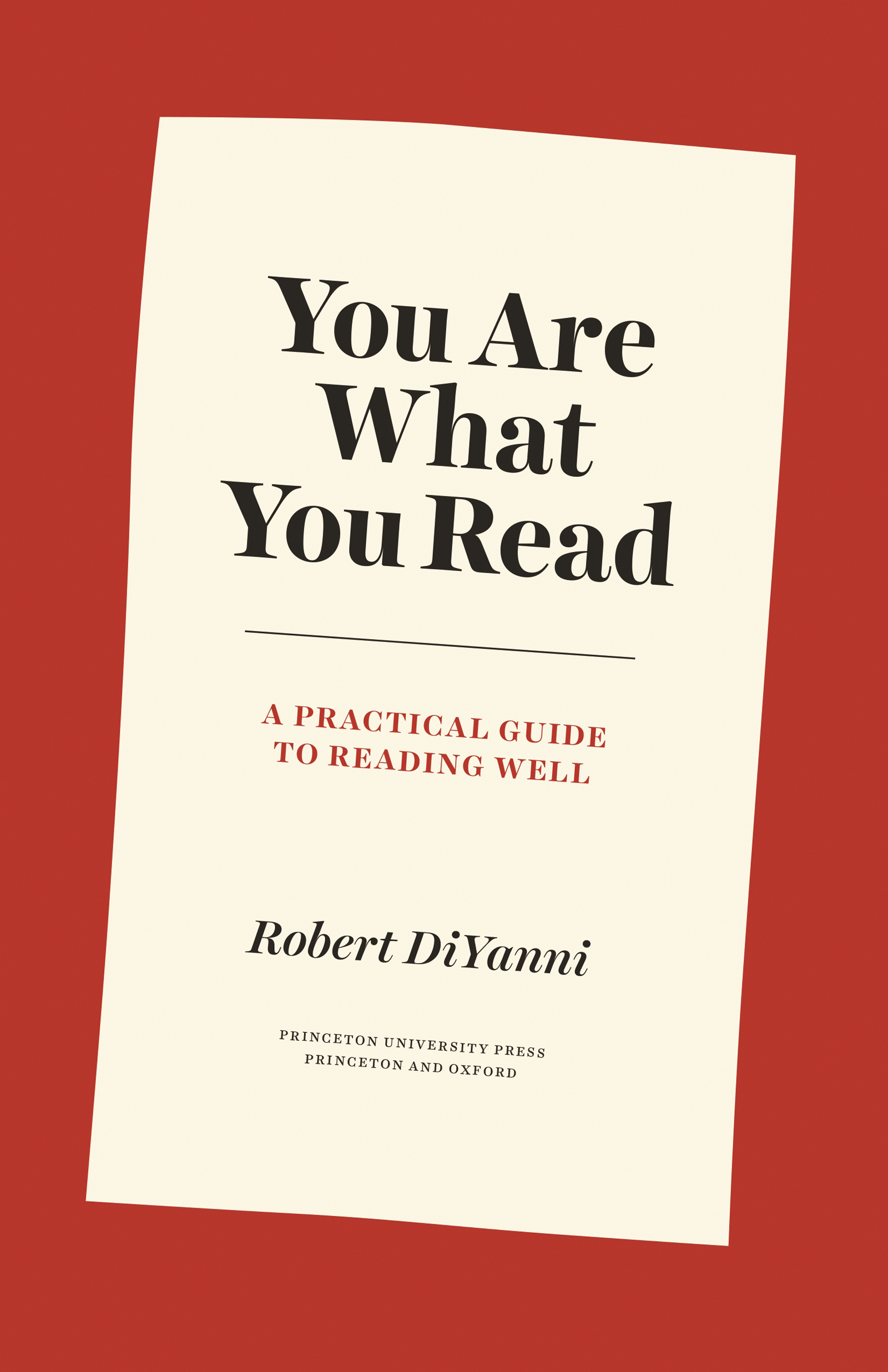You Are What You Read
SKILLS FOR SCHOLARS
You Are What You Read: A Practical Guide to Reading Well, Robert DiYanni
Super Courses: The Future of Teaching and Learning, Ken Bain
Syllabus: The Remarkable, Unremarkable Document That Changes Everything, William Germano and Kit Nicholls
Leaving Academia: A Practical Guide, Christopher L. Caterine
A Field Guide to Grad School: Uncovering the Hidden Curriculum, Jessica McCrory Calarco
How to Think like Shakespeare: Lessons from a Renaissance Education, Scott Newstok
The Craft of College Teaching: A Practical Guide, Robert DiYanni and Anton Borst
You Are What You Read
A Practical Guide to Reading Well
Robert DiYanni
PRINCETON UNIVERSITY PRESS
Princeton and Oxford
Copyright 2021 by Princeton University Press
Princeton University Press is committed to the protection of copyright and the intellectual property our authors entrust to us. Copyright promotes the progress and integrity of knowledge. Thank you for supporting free speech and the global exchange of ideas by purchasing an authorized edition of this book. If you wish to reproduce or distribute any part of it in any form, please obtain permission.
Requests for permission to reproduce material from this work should be sent to
Published by Princeton University Press
41 William Street, Princeton, New Jersey 08540
6 Oxford Street, Woodstock, Oxfordshire OX20 1TR
press.princeton.edu
Of Smells by Michel de Montaigne. Originally published in The Complete Essays of Montaigne, translated by Donald Frame. Copyright 1943 by Donald Frame. renewed 1986. All rights reserved. Used with the permission of Stanford University Press, www.sup.org
All Rights Reserved
Library of Congress Cataloging-in-Publication Data
Names: DiYanni, Robert, author.
Title: You are what you read : a practical guide to reading well / Robert DiYanni.
Description: Princeton : Princeton University Press, [2021] | Includes bibliographical references and index.
Identifiers: LCCN 2020029863 (print) | LCCN 2020029864 (ebook) | ISBN 9780691206783 (hardback) | ISBN 9780691216607 (epub)
Subjects: LCSH: Reading. | LiteratureAppreciation.
Classification: LCC PN83 .D59 2021 (print) | LCC PN83 (ebook) | DDC 418/.4dc23
LC record available at https://lccn.loc.gov/2020029863
LC ebook record available at https://lccn.loc.gov/2020029864
Version 1.0
British Library Cataloging-in-Publication Data is available
Editorial: Peter Dougherty and Alena Chekanov
Production Editorial: Lauren Lepow
Text Design: Pamela L. Schnitter
Jacket design: Matt Avery (Monograph LLC)
For Ruth and Keira Ruth,
who share a love of reading
Its the books,
the reading that can change ones life.
Im the living evidence.
S EAN C ONNERY
Preface
The title of this book can be taken literally. We are what we read. While every individual is unique, all of us possess unlimited potential. Eat well and you will be healthier. Exercise well and you will be stronger. Read well and you will be what? Smarter? Maybe. More informed? Surely. But this book is not about those things. This book suggests that in reading well you will be more alive.
Reading well awakens and broadens the mind. It provides a vast realm of inner experience that extends far beyond everyday life. Reading well, you will still be you. But you will be a better and more interesting version of yourself.
My aim in this book is to present varied approaches to the deeply gratifying experience of reading, especially reading literature. These strategies can lead to thought-provoking and emotionally resonant textual encounters. You Are What You Read celebrates readings value for learning and for living. It presents ways to enrich your reading practices and enhance your reading pleasure.
This is not a theoretical book, but a practical one, its aim to improve a readers understanding and appreciation of literature. Its intended for anyone interested in getting more out of reading and more out of life. The brief discussions of theory in the books later chapters illuminate the benefits of reading. I present just enough theory to enhance literary discernment, deepen literary understanding, and increase literary pleasure.
My major claim is that learning to read confidently and skillfully enhances our lives and helps us enjoy life more completely. This enjoyment stems from honing our powers of observation and enhancing our capacity for thinking well. I believe, in short, that we can attain better lives through reading.
We read with multiple goalsfor information, enjoyment, self-gratification, self-advancement; to be instructed, entertained, moved, inspired. We read to understand and appreciate, to grow and develop. You Are What You Read attempts to help readers achieve these goals.
The rewards of reading are especially important today, a time of complex challenges we are all confronting. Economic turbulence has combined with frightening uncertainties and inexorable ambiguities. These disturbing realities are inflected across a spectrum of recent and ongoing catastrophes, from the Covid-19 pandemic to climate change, with extreme forms of weather cascading in ever-longer droughts along with wilder and more destructive fires and floods; from the global political and economic crises of mass migration and unemployment to individual and social problemscrippling addictions, surges in stress and anxiety, dramatic upheavals in education and social servicesall exacerbated by the Covid-19 crisis and the inescapable changes that accompany it.
Reading wellwith skill and confidence, even expertisematters now more than ever. Reading literature with understanding and pleasure can help us navigate the myriad disruptions we are living through. Reading wont solve lifes increasingly intractable problems, but it can provide perspective on them and relief from them. Reading well can help us better understand the challenges we face together and help ameliorate the pain and suffering we endure. It can also take our minds off them for a while.
The value of learning to read well lies in the manifold pleasures it brings, the knowledge it affords, and the imaginative enlargement of life it yields. Learning to read well and to enjoy better reading is not as hard as most people think. Each of the books chapters recommends ways to achieve this seemingly ambitious goal. Each illustrates how reading heightens our appreciation of living.
Taken together, the six chapters present a suite of interrelated, mutually reinforcing strategies for reading well.
- focuses on listening. It argues that seeking textual meaning first and foremost yields far less value than what happens when we resist pouncing on meaning and, instead, begin by asking what texts say and suggest, what they show and do.
- poses and answers two questions: What truths do texts tell? How might we read for those textual truths?
- demonstrate how we can engage works of nonfiction and fiction productively and pleasurably.
- contextualizes practical applications of reading with a bit of theory. It considers readings paradoxical pleasures via the dialectical energies that impel and enliven the reading of literature.
- , it recapitulates the books major themes and underscores the entwining of reading and living.


